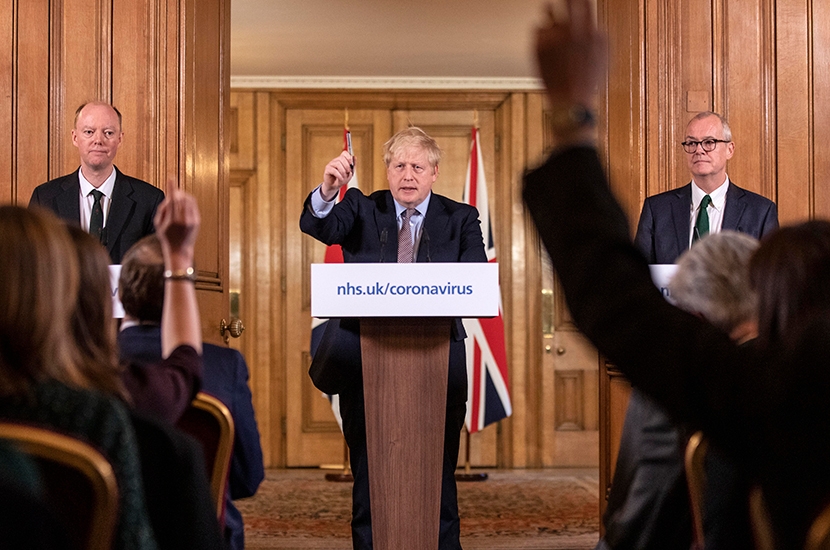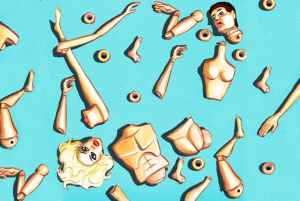Fear is the politician’s friend. When terror grips the public, an opportunity arises for those in power to step forward as the people’s guide and protector in dangerous times. One sees this in wars. One sees it whenever the public suspects hostile conspiracies, networks of spies or mischief-makers. We likewise cleave to leaders who will confound predatory foreign powers, terrorist plots or the danger of being swamped by waves of immigrants. In fear or anxiety the people will hug their leaders closer, and their leaders know this as surely as every priest knows that despair and anxiety are his faith’s most reliable draw.
Do not, therefore, overlook the power of a submicroscopic virus to herd the flock we call the electorate towards the shepherds we call the political class. And don’t suppose the shepherds haven’t noticed.
The coronavirus panic we’ve landed ourselves in brings with it woes for politicians and people alike, but few in politics or public administration are going to lose their jobs; millions of others will; and meanwhile there is something almost beyond price now within reach of the party in government. How can I express this, even name it, without sounding insulting? Let me make clear what I do not mean to imply.
I do not imply that anyone in Britain’s national leadership is luxuriating in any conscious sense of advantage from the COVID-19 crisis. I do not imply that the Conservative party is cynically anticipating the reward that could flow from their near-ecstatic embrace of our national religion, the National Health Service. Our governing class will have persuaded themselves that their advice is blind to everything but the greater public good. I freely grant that.
But perception of advantage or disadvantage is often unconscious. Subliminally, political decision-making these last two months has been partly driven by a powerful political imperative to be associated with the National Health Service and to harvest some of the respect, even adoration, the NHS commands; and by an equally powerful political dread of being seen to have failed the NHS at a moment of danger.
Now if the NHS and the public good are the same thing, there can be no harm here. But what if they are not? What if our NHS is not, in fact, as successful at its job as the public think? Or — and this is the most fundamental question — what if the short-term prevention of death could conflict with the longer-term wellbeing of the nation? I’ll deal with each of those two questions in turn, but first remind you why Conservative politicians shrink from any hint of friction between themselves and our health service.
Ever since the post-war Labour government nationalized health, the Tories have been half-suspected of secretly doubting the project but going along with it because it’s wildly popular with voters. When, therefore, Labour governments economize on health spending, we’re ready to accept that this is because the chancellor’s cupboard is bare. When Tory governments do it, we’re readier to believe it’s because they don’t love the NHS as they should.
This mistrust has exacted a persistent electoral price for the Tories: the most popular idea in Britain has been the idea Labour cherishes and the Tories (voters suspect) don’t. Now along comes a crisis that offers a Conservative government a historic chance to show that they and their party care. Who with a political bone in their body wouldn’t leap to grasp it?
Next to the first of my two questions. Is our health service as good as we think? Ministers are loath to let daylight in on the magic of our NHS, but it strikes me, reading between the lines, that Matt Hancock thinks too many health workers are using masks, gloves and gowns wastefully, while others won’t get tested because they prefer to stay isolated at home. But do ministers breathe a word of it? Our health service enjoys a position akin to the Thai monarchy: no breath of complaint, question, or even levity is permitted.
Overlooking the fact that other countries’ health systems seem to have done as well as or better than ours, we applaud from front windows or crowd on to Westminster Bridge (flouting health advice) to clap. Many find this moving. I find it as mawkish as teddy bears and flowers for Diana. Of course front line NHS staff are dutiful and brave. The poor bloody infantry always are. The monolith they work for, however, has appeared slow-footed and logistically challenged, its command structure so tangled that nobody seems to know which levers are actually connected to anything. Are we clapping the bureaucracy when we clap?
If it’s the front liners we’re clapping, then how about some applause for Britain’s bus drivers? Comparing this workforce with NHS nurses makes bus-driving look like a much bigger COVID risk, but we’d need to know more about the two workforces. Suffice it to say that I’ve seen no evidence so far that working on the front line of the NHS is inherently more dangerous than much other public-facing work. If such evidence exists, let’s have it.
And how about applause for the nation’s small shopkeepers and supermarket counter staff, largely unsung heroes? But no, a secular society whose first fear is death is making cathedrals of our hospitals, priestly vestments of personal protection equipment, and altars of ventilators. And cabinet ministers, knowing it, scurry to lead the congregation in prayer, hoping some of the divine authority will rub off on them.
I have a question. The measure of the present lockdown’s success is — must by definition be — the number who have never been exposed to the virus once the lockdown ends. This risks a ‘second wave’ of infections. Before ministers reversed the previous ‘herd immunity’ strategy, this risk will have been considered. The argument the other way will have been that in the short term the NHS might be overwhelmed, with avoidable deaths of identifiable people resulting. Ministers will have had to weigh one horror against the other. Which of the following alternatives do you think tipped the balance for them: (a) the numbers of likely deaths attached to each strategy? Or (b) the very political horror of TV footage of hospitals turning ambulances away? In other words, might ministers have chosen, unconsciously, to prolong the public agony in order to avoid political agony? I leave the question hanging.
This article was originally published in
The Spectator’s 10,000th UK magazine. Subscribe to the US edition here.


















